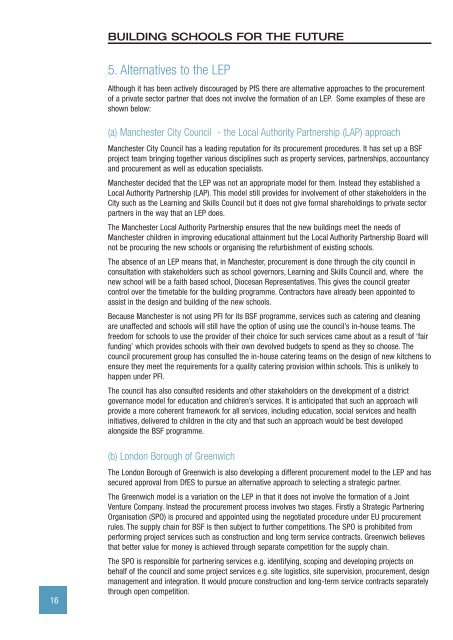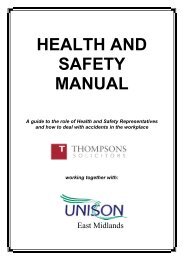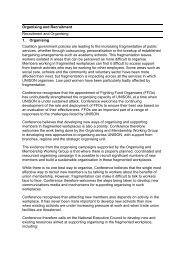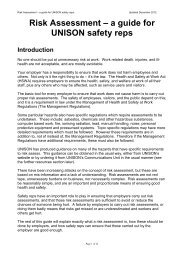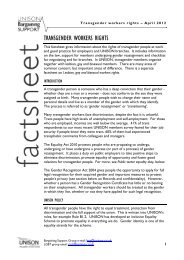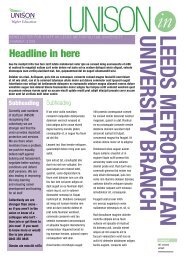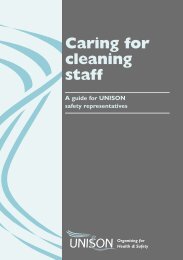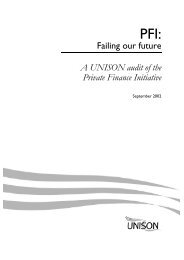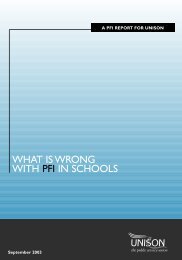Building schools for the future - Unison
Building schools for the future - Unison
Building schools for the future - Unison
Create successful ePaper yourself
Turn your PDF publications into a flip-book with our unique Google optimized e-Paper software.
16<br />
BUILDING SCHOOLS FOR THE FUTURE<br />
5. Alternatives to <strong>the</strong> LEP<br />
Although it has been actively discouraged by PfS <strong>the</strong>re are alternative approaches to <strong>the</strong> procurement<br />
of a private sector partner that does not involve <strong>the</strong> <strong>for</strong>mation of an LEP. Some examples of <strong>the</strong>se are<br />
shown below:<br />
(a) Manchester City Council - <strong>the</strong> Local Authority Partnership (LAP) approach<br />
Manchester City Council has a leading reputation <strong>for</strong> its procurement procedures. It has set up a BSF<br />
project team bringing toge<strong>the</strong>r various disciplines such as property services, partnerships, accountancy<br />
and procurement as well as education specialists.<br />
Manchester decided that <strong>the</strong> LEP was not an appropriate model <strong>for</strong> <strong>the</strong>m. Instead <strong>the</strong>y established a<br />
Local Authority Partnership (LAP). This model still provides <strong>for</strong> involvement of o<strong>the</strong>r stakeholders in <strong>the</strong><br />
City such as <strong>the</strong> Learning and Skills Council but it does not give <strong>for</strong>mal shareholdings to private sector<br />
partners in <strong>the</strong> way that an LEP does.<br />
The Manchester Local Authority Partnership ensures that <strong>the</strong> new buildings meet <strong>the</strong> needs of<br />
Manchester children in improving educational attainment but <strong>the</strong> Local Authority Partnership Board will<br />
not be procuring <strong>the</strong> new <strong>schools</strong> or organising <strong>the</strong> refurbishment of existing <strong>schools</strong>.<br />
The absence of an LEP means that, in Manchester, procurement is done through <strong>the</strong> city council in<br />
consultation with stakeholders such as school governors, Learning and Skills Council and, where <strong>the</strong><br />
new school will be a faith based school, Diocesan Representatives. This gives <strong>the</strong> council greater<br />
control over <strong>the</strong> timetable <strong>for</strong> <strong>the</strong> building programme. Contractors have already been appointed to<br />
assist in <strong>the</strong> design and building of <strong>the</strong> new <strong>schools</strong>.<br />
Because Manchester is not using PFI <strong>for</strong> its BSF programme, services such as catering and cleaning<br />
are unaffected and <strong>schools</strong> will still have <strong>the</strong> option of using use <strong>the</strong> council’s in-house teams. The<br />
freedom <strong>for</strong> <strong>schools</strong> to use <strong>the</strong> provider of <strong>the</strong>ir choice <strong>for</strong> such services came about as a result of ‘fair<br />
funding’ which provides <strong>schools</strong> with <strong>the</strong>ir own devolved budgets to spend as <strong>the</strong>y so choose. The<br />
council procurement group has consulted <strong>the</strong> in-house catering teams on <strong>the</strong> design of new kitchens to<br />
ensure <strong>the</strong>y meet <strong>the</strong> requirements <strong>for</strong> a quality catering provision within <strong>schools</strong>. This is unlikely to<br />
happen under PFI.<br />
The council has also consulted residents and o<strong>the</strong>r stakeholders on <strong>the</strong> development of a district<br />
governance model <strong>for</strong> education and children’s services. It is anticipated that such an approach will<br />
provide a more coherent framework <strong>for</strong> all services, including education, social services and health<br />
initiatives, delivered to children in <strong>the</strong> city and that such an approach would be best developed<br />
alongside <strong>the</strong> BSF programme.<br />
(b) London Borough of Greenwich<br />
The London Borough of Greenwich is also developing a different procurement model to <strong>the</strong> LEP and has<br />
secured approval from DfES to pursue an alternative approach to selecting a strategic partner.<br />
The Greenwich model is a variation on <strong>the</strong> LEP in that it does not involve <strong>the</strong> <strong>for</strong>mation of a Joint<br />
Venture Company. Instead <strong>the</strong> procurement process involves two stages. Firstly a Strategic Partnering<br />
Organisation (SPO) is procured and appointed using <strong>the</strong> negotiated procedure under EU procurement<br />
rules. The supply chain <strong>for</strong> BSF is <strong>the</strong>n subject to fur<strong>the</strong>r competitions. The SPO is prohibited from<br />
per<strong>for</strong>ming project services such as construction and long term service contracts. Greenwich believes<br />
that better value <strong>for</strong> money is achieved through separate competition <strong>for</strong> <strong>the</strong> supply chain.<br />
The SPO is responsible <strong>for</strong> partnering services e.g. identifying, scoping and developing projects on<br />
behalf of <strong>the</strong> council and some project services e.g. site logistics, site supervision, procurement, design<br />
management and integration. It would procure construction and long-term service contracts separately<br />
through open competition.


